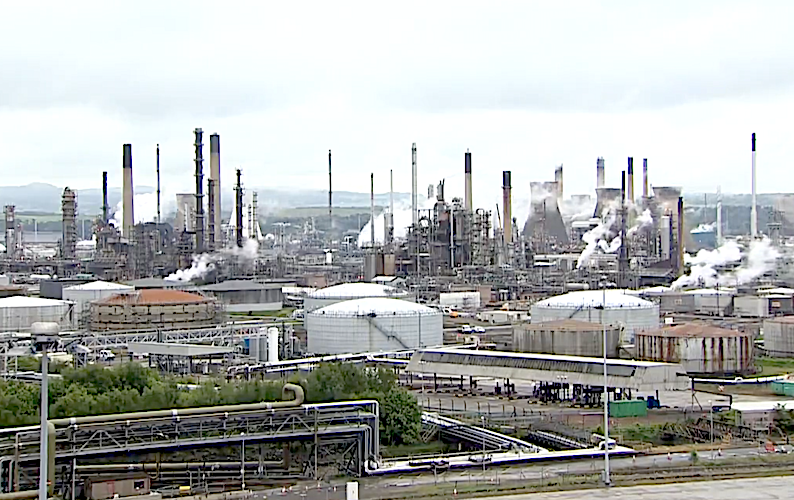Saving Grangemouth means saving oil – Daily Business Magazine


Without a massive u-turn on energy policy, there is no requirement for the oil refinery, writes TERRY MURDEN
Just like the closure of the last coal mine, the end of crude oil refining at Grangemouth was felt like a death in the family. A century of industrial endeavour is over and the facilities that literally fuelled a nation stand idle. Four hundred workers have been sent home and a community that depended on their wage packets is left waiting to discover its own fate.
Social media has been awash with the usual vitriol. The Labour party, and its Scottish leader Anas Sarwar in particular, have been the targets of the hate mob, accused of betrayal and downright lies over the plant’s future and subject to calls for medieval-style punishment.
Central to this anger, meted out by a mix of mildly persuasive intellectuals, commentators, political opponents and those who can only be described as misguided and ill-informed blabbermouths, is the belief that the refinery should have been saved and that refining should continue. A nation that produces oil, they say, should have its own means of getting the finished product to market.
Therein lies the problem. Those proclaiming that an independent Scotland would keep the refinery open seem to have overlooked the prevailing political zeal to wind down its essential product. The plain truth is that to save Grangemouth, we first have to save the oil industry, and that will require the mother of all u-turns on energy policy. As things stand, the SNP and Labour are committed to scaling back oil and gas production and, as the oil market declines, so too does all the infrastructure that surrounds it.
Outraged nationalists demanding the Labour government takes similar action towards Grangemouth as it has towards saving the British Steel plant at Scunthorpe are missing a key point. Both may be making huge losses, but Scunthorpe is the sole provider of a product that is in demand, not least to make the nationalists’ cherished wind turbines. War in Ukraine and its affect on supplies has reminded us that we need our own source of steel. Grangemouth, on the other hand, is one of half a dozen UK oil refineries and there is sufficient capacity in the system to handle current levels of production without it.
Political opportunism is nothing new, particularly when there is a Scottish general election to be fought, but the calls for nationalisation of Grangemouth from First Minister John Swinney and his Westminster leader Stephen Flynn are a touch mischievous and risk tipping the debate into even more venomous levels of what passes for political discourse.
The SNP, along with the Tory Government, had known for five years that Grangemouth was a busted flush. Not only was there was no mention of the ‘N’ word, there were no calls for any form of intervention. Not a penny offered in support of the plant and its workers.
The SNP and the new Labour government took another look at the books last year, and once again, realised that they simply could not afford to meet the half million dollars a day losses that the private sector no longer considers sustainable.
As iain Hardie of the plant’s owner Petroineos told a parliamentary committee last month: “I can only presume they drew the same conclusions we have drawn that to continue with refining operations was not an economic proposition and therefore they were not prepared to put taxpayers’ money into it.”
It was the arrival of Ed Miliband as UK Energy Secretary last summer that changed the mood, said Mr Hardie. Mliband and his team just ‘got it in a way that we had not had before”.
Miliband – another of those feeling the harsh tongue of the hate mob – was singled our for praise by Hardie. Speaking to the Scottish Affairs Committee in the Commons, he acknowledged Miliband’s leadership and the work shared with Labour’s Energy Minister Michael Shanks and Gillian Martin, the Scottish acting Energy Secretary. Working together under the Project Willow initiative to find a future for Grangemouth, “we have driven this at transactional pace”, said Mr Hardie. Anu Bhambi, who helped write the Project Willow report, told MPs that the nine renewables options presented an “exciting” future for the site.
This cross-party action and the work done by those on the Willow inquiry has barely got the credit it deserves. Instead, a toxic blame game has been played out across social media, which has been fuelled [pardon the pun] by Swinney and Flynn breaking the cross-party consensus to make their point-scoring switch to the nationalisation camp. In Swinney’s case, this is particularly ironic given his regular calls for a less divisive-style of politics and for all parties to work together for the good of Scotland.
As for the Scottish Labour leader, he has a lot of work to do if Grangemouth is not to be the issue that costs him his political career. His claim during a TV debate last year that an incoming Labour government would “step in and save the jobs at the refinery” is being repeated ad nauseum on social media.
He should be promoting the work of his Westminster colleagues Miliband and Shanks, making the case for speeding up investment in the site and making it clear why politicians of all parties, including his own, decided that it was no longer able to refine oil. Maybe then his opponents will start listening.
Terry Murden was Editor and Business Editor at The Sunday Times Scotland, Business Editor at The Scotsman, and Business and City Editor at Scotland on Sunday. He is now Editor of Daily Business.
>Latest Daily Business news
Related
#Saving #Grangemouth #means #saving #oil #Daily #Business #Magazine




